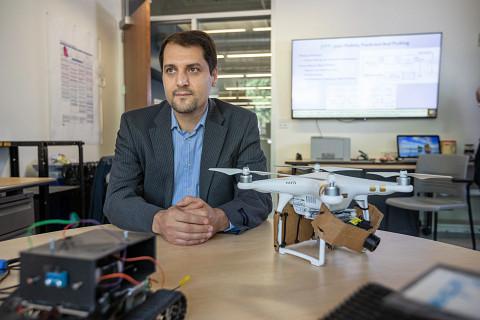NSF-funded project to enable UAVs to monitor themselves and each other, taking into account different scenarios

Credit: Courtesy Northern Arizona University
Recent advances in artificial intelligence (AI) have opened the door for an unprecedented number of uses for unmanned autonomous vehicles (UAVs). Groups of drones now can work together in networks for purposes such as traffic control, smart agriculture, surveillance and security systems, law enforcement, public safety and much more.
However, current drone systems are missing key considerations such as the ability to identify and respond properly to environmental and behavioral factors, says Abolfazl Razi, an assistant professor in the School of Informatics, Computing, and Cyber Systems (SICCS) at Northern Arizona University.
That’s why Razi is working to make drones smarter and more autonomous. The director of NAU’s Wireless Networking and Smart Health (WiNeSH) Lab, Razi has received a $480,000 grant from the National Science Foundation for his project titled, “Proactive Inverse Learning of Network Topology for Predictive Communication among Unmanned Vehicles.”
Through computer programming, he believes drones can be developed to express situational awareness, recognize malfunctioning, suspicious or invading UAVs and make adjustments on the fly.
“When we have hundreds of drones with limited communication ranges flying together, we need to keep connectivity and information flow uninterrupted,” Razi said. “The focus of this project is to enable UAVs to monitor themselves and each other, taking into account different scenarios.”
An important component of the project deals with adversity. “A drone that has joined a mission may show an anomaly and violate the set regulations for the mission. Instead of following the pre-planned motion trajectory, it may go dangerously close to other drones, for example,” he said. “We want other drones to be able to analyze the trajectory and identify misbehavior or misconduct, or even interference of an outside drone and diagnose the problems within a network.”
Razi says critical missions could involve forest fires, traffic accidents, search and rescue or military operations. “If someone tries to penetrate your mission by sending in their own drones and making problems either on purpose or by accident, we want the UAVs to find the intrusion and cope with the situation.”
The research is designed to make drones more independent of human control and observation, act like teammates by coordinating with others in their area and be able to identify intruding or enemy drones.
Razi will conduct experiments with UAV teams in his WiNeSH lab and outdoors in northern Arizona. “Each drone will be equipped with software capable to make decisions about the environment,” Razi said. “Also, each will have its eyes on the other drones and will observe whether its neighbors are making decisions that are rational or irrational.”
The research will include the human-inspired method of proactive learning from limited experience by exposing the software to various conditions and involve reverse engineering of the UAVs’ decision support system (DSS).
“This approach serves for AI-enabled networking by incorporating the predicted responses into system protocols,” Razi said.
The three-year project is expected to benefit U.S. government agencies, organizations and researchers with the ultimate goal of developing better systems of multiple autonomous drones.
###
About Northern Arizona University
Northern Arizona University is a higher-research institution providing exceptional educational opportunities in Arizona and beyond. NAU delivers a student-centered experience to its 31,000 students in Flagstaff, statewide and online through rigorous academic programs in a supportive, inclusive and diverse environment. Dedicated, world-renowned faculty help ensure students achieve academic excellence, experience personal growth, have meaningful research opportunities and are positioned for personal and professional success.
Media Contact
Abolfazl Razi
[email protected]




